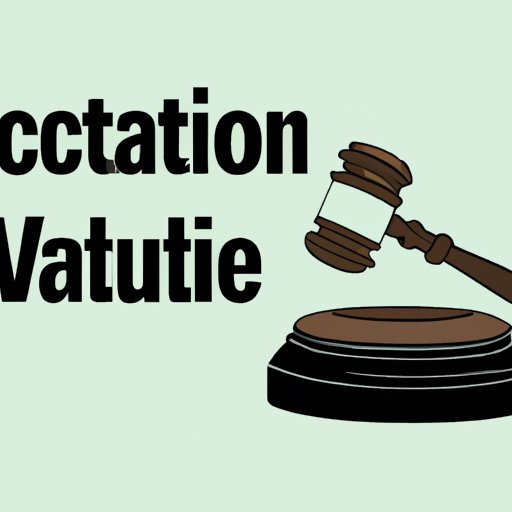Introduction
When you are convicted of a crime, the conviction may stay on your record forever. But in some cases, you may be able to vacate the conviction, which means that the judgment is set aside or dismissed. This article will explain what vacating a conviction means and discuss the pros and cons of the process.
Explaining What Vacating a Conviction Means: A Guide for the Non-Lawyer
In order to understand what vacating a conviction means, it is important to understand the legal process involved. In most states, when a person is convicted of a crime, they are sentenced and the conviction is entered into the court’s records. The conviction then becomes part of the public record and can be viewed by employers, landlords, and other entities. Depending on the state, the conviction may remain on the record indefinitely.
In some states, however, a person may be eligible to vacate the conviction. This process involves filing a motion with the court asking for the conviction to be vacated. If the court grants the motion, the conviction is then removed from the public record and the person is no longer considered to have been convicted of the crime.
In order to be eligible to vacate a conviction, the person must meet certain requirements. These requirements vary from state to state, but generally include the following: the person must have completed all terms of their sentence, including any probation or parole; the person must not have any other convictions; and the person must not have any pending charges.
The Pros and Cons of Vacating a Criminal Conviction
Vacating a criminal conviction can have both advantages and disadvantages. It is important to consider the pros and cons before deciding whether to request to vacate a conviction.
Advantages of Vacating a Conviction
One of the main advantages of vacating a conviction is that it removes the conviction from the public record. This can make it easier for the person to find employment and housing, as potential employers and landlords will not be able to view the conviction. Vacating a conviction can also help to restore the person’s reputation and provide a sense of closure for the person.
Disadvantages of Vacating a Conviction
One of the main disadvantages of vacating a conviction is that it does not erase the conviction completely. While the conviction is removed from the public record, it is still part of the person’s criminal history and can be viewed by law enforcement agencies. Additionally, the process of vacating a conviction can be time consuming and expensive and there is no guarantee that the court will grant the motion.

What to Consider Before Requesting to Vacate a Conviction
Before requesting to vacate a conviction, it is important to research state laws to determine if the person is eligible to do so. Additionally, it is important to consult with an attorney who is experienced in criminal law to ensure that the motion is properly filed and to understand the possible outcomes of the process.

The Impact of Vacating a Conviction on Your Life
Vacating a conviction can have a positive impact on a person’s life. It can help to improve employment opportunities and make it easier to obtain professional licensing. Additionally, it can help to restore the person’s reputation and provide a sense of closure.

How to Successfully Navigate the Process of Vacating a Criminal Conviction
In order to successfully navigate the process of vacating a criminal conviction, it is important to understand the legal process and research state laws. Additionally, it is important to consult with an attorney and prepare for court hearings. Once the motion is filed, the court will consider the evidence presented and decide whether to grant the motion.
Conclusion
Vacating a criminal conviction can have a positive impact on a person’s life by improving employment opportunities, restoring reputation, and providing a sense of closure. In order to successfully navigate this process, it is important to understand the legal process, research state laws, and consult with an attorney. It is also important to consider the pros and cons of vacating a conviction before making a decision.
(Note: Is this article not meeting your expectations? Do you have knowledge or insights to share? Unlock new opportunities and expand your reach by joining our authors team. Click Registration to join us and share your expertise with our readers.)
